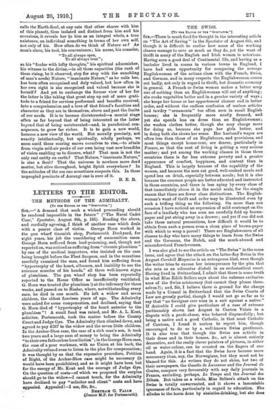LETTERS TO THE EDITOR.
THE METHODS OF THE ADMIRALTY. [To THR EDITOR or THIL " SPECTATOR...1 Stn,—" A demand that such a wicked proceeding should be rendered impossible in the future" (" The Naval Cadet Case," Spectator, August 6th, p. 195). Reading the above, and cordially agreeing, I think of another case which deals with a poorer class of victim. George Horn worked in the gun wharf tinsmith shop, Portsmouth Dockyard, for eight years, his job the unsoldering of ammunition cases. George Horn suffered from lead-poisoning, and, though not reported on, was noticed as suffering from " chronic plumbism " by one of the medical inspectors, who insisted on the case being brought before the Fleet Surgeon, and in the meantime carefully examined the man, and found him suffering from "hypertrophy of the heart, albumen, and inability to use the extensor muscles of his hands," all three well-known signs of plumbism. The gun wharf shop has been repeatedly reported to the Home Office as insufficiently ventilated. G. Horn was treated (for plumbism !) at the infirmary for three weeks, and passed on to Haslar, where, notwithstanding every care, he died in one month. He left a widow and seven children, the eldest fourteen years of age. The Admiralty were asked for some compensation, and declined, saying that G. Horn died of "hypertrophy of the heart anterior to the plumhism " ! A small fund was raised, and Mr. A. L. Kent, solicitor, Portsmouth, took the matter before the County Court and Judge Gye. The Admiralty then climbed down, and agreed to pay E2.67 to the widow and the seven little children. In the Archer-Shee case, the case of a rich man's son, it took two years and a large sum of money to bring the Admiralty "to their own fathomless humiliation"; in the George Horn case, the case of a poor workman, with no Union at his back, the Admiralty refused even to listen to the plea for compensation; it was thought by us that the expensive procedure, Petition of Right, of the Archer-Shee case might be necessary (it would have been prohibitive), and so it might have been but for the energy of Mr. Kent and the courage of Judge Gye. On the question of costa—of which we proposed the surplus should go to the widow—I cannot touch, for the Admiralty have declined to pay "solicitor and client" costs and have appealed. Appealed !—I am, Sir, &c.,
BERTRAM G. FALLS (Junior M.P. for Portsmouth).






































 Previous page
Previous page